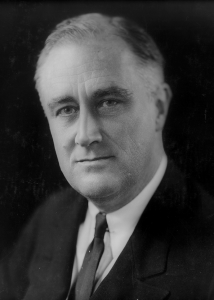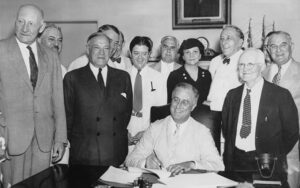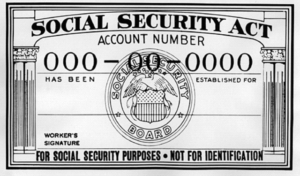
 As a part of fallout of the Great Depression, and as a product of the “New Deal” ambitions of Franklin D Roosevelt, America came into the new era of Social Security, a plan to assign unique nine-digit numbers to some 26 million US workers. The plan didn’t exactly do what it was supposed to do, in a number of ways, and it has as to “social security,” it has been anything but. Social Security was not intended to be a national ID number, but it has turned out to be exactly that. It has been used by banks and insurance agencies, to track tax returns, and to identify college students. By the 1970s, Social Security numbers indexed a wealth of sensitive information in computer data banks, becoming a severe risk for identity theft, and prompting major privacy legislation. These types of security issues could not have been anticipated by the pre-computer, pre-internet, and pre-hacking America of the 1930s, when Social Security was founded.
As a part of fallout of the Great Depression, and as a product of the “New Deal” ambitions of Franklin D Roosevelt, America came into the new era of Social Security, a plan to assign unique nine-digit numbers to some 26 million US workers. The plan didn’t exactly do what it was supposed to do, in a number of ways, and it has as to “social security,” it has been anything but. Social Security was not intended to be a national ID number, but it has turned out to be exactly that. It has been used by banks and insurance agencies, to track tax returns, and to identify college students. By the 1970s, Social Security numbers indexed a wealth of sensitive information in computer data banks, becoming a severe risk for identity theft, and prompting major privacy legislation. These types of security issues could not have been anticipated by the pre-computer, pre-internet, and pre-hacking America of the 1930s, when Social Security was founded.
In November of 1936, the newly formed Social Security Board set out to assign those unique nine-digit numbers American workers. They called this a task “of a magnitude never before equaled in any Government or private undertaking.” The first Social Security number was issued on December 1, 1936, to a man named John David Sweeney Jr. Sweeney, a 23-year-old man was noted as saying that his retirement was “a long way off.” Since that time Social Security has suffered many types of abuse, and a gross miscalculation in funds, mainly stemming from the fact that with the legalizing of abortion, millions of Americans who would have eventually earned wages and paid into the program, were murdered, bringing a shortage of funds in unprecedented proportions. People will surely argue one or more of the points made here, but the facts remain.
A product of its time, the Social Security Number came about due to the economic wreckage of the Great Depression and the disastrous New Deal ambitions of Franklin D Roosevelt. People didn’t really understand the ramifications of the Social Security Numbers, because the program was overshadowed by the nation-changing program of which they were part. Nevertheless, those numbers would become affixed to nearly every American life over the next century, while spurring new uses of punch cards and filing systems, as well as all the new dilemmas around data and security. In the end, it would probably been better if we had never started it, but then I suppose that some type of national identification system was inevitable. We are a very large nation, and 
 in my opinion, IDs should be used for many things, such as voting, flying, re-entry to our borders, and a host of other things that make each of us unique. Maybe Social Security numbers were the only way, or maybe we could have waited on this program until we could have found a more “secure” form of Social Security.
in my opinion, IDs should be used for many things, such as voting, flying, re-entry to our borders, and a host of other things that make each of us unique. Maybe Social Security numbers were the only way, or maybe we could have waited on this program until we could have found a more “secure” form of Social Security.


Leave a Reply